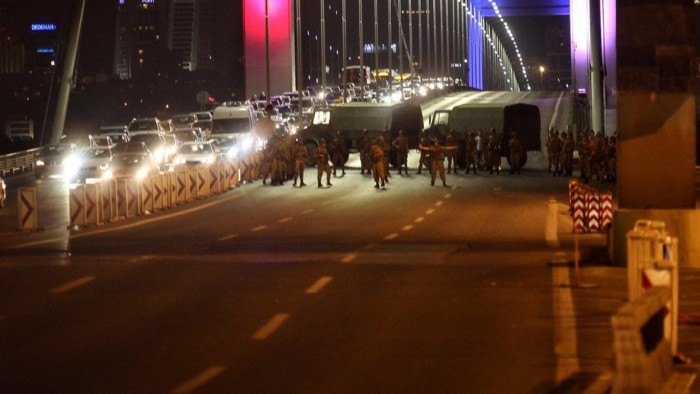Anxious relatives await fate of troops caught up in Turkish coup

Roula Khalaf, Editor of the FT, selects her favourite stories in this weekly newsletter.
The young man, clad in camouflage trousers and black T-shirt and flanked by two guards, waved and flashed a grin. His father, who had waited for hours in Istanbul’s main courthouse to catch a glimpse of him, waved back helplessly, trapped behind a barrier stopping families from entering the initial hearings for thousands detained after last week’s failed coup. He tried to look encouraging. But as soon as the 20-year-old soldier turned away, the older man dropped to the ground, sobbing and shaking at the sight of his boy being led from court.
The botched plot lead to the death of at least 240 civilians and security personnel who fought back against the insurrectionists. But the coup leaders also risked ruining the lives of the ordinary soldiers working under their orders. Some of them believed they were going out on a training exercise when they left their barracks on Friday night.
In Istanbul’s Caglayan courthouse on Wednesday, hundreds of young men were marched in crocodile line up and down the echoing marbled corridors. Many wore maroon or bottle-green shorts with black socks pulled partway up their calves. They looked dirty and disheveled but there were no obvious signs of mistreatment.
On each floor of the towering building, clusters of anxious families waited outside the sectioned-off row of rooms designated as “heavy penal courts”. Some sobbed. Others sat quietly or paced up and down. Each time a lawyer emerged, a gaggle of mothers, fathers, sisters and brothers desperate to hear news from inside would instantly form.
More than 5,000 members of the armed forces were rounded up in the wake of the failed plot. Among them were 115 generals and 350 officers. But many of those waiting at Caglayan on Wednesday were there to support students from two military colleges in Istanbul.
One father, a former bank worker who is off work with bone marrow cancer that has left him looking pale and gaunt, said that his son, aged 21, was a student at the Kuleli military high school in Cengelkoy, a tranquil waterside district on the Asian side of Istanbul.
The man — who like all those interviewed asked for his name to be withheld for fear of jeopardising the cases — had been unable to speak to his son. However, he had seen a photograph of him with another soldier on the first bridge across Istanbul’s Bosphorus straits, seized by plotters on Friday night.
He was convinced of his boy’s innocence. “In my family, about 60 per cent of us have been in the security services,” he said. “We love our country. We love our flag.”
Asked if his child could have been a follower of Fethullah Gulen, the exiled cleric whose supporters are accused of orchestrating the coup attempt, he was adamant. “My son is a normal soldier,” he said. “He was sent to the first bridge by his commander.”
Describing himself as a supporter of President Recep Tayyip Erdogan, he was convinced that his son would be released. “I believe in Turkish justice,” he said. “My son is not a terrorist. He is not a traitor.”
It was unclear whether his hopes would be realised. Witnesses have said that soldiers on the bridge opened fire on crowds of ordinary citizens as they surged towards the troops. Other students from the Kuleli academy allegedly took part in the bloody battles in the surrounding district that left between 10 and 17 civilians dead. After the coup was put down, a total of 80 students from the school were reportedly arrested, including 62 aged between 14 and 17.
Among the most distraught relatives was a mother whose only son is a cadet at the Turkish air force military academy in Yesilkoy, near Istanbul’s Ataturk airport. Dressed in jeans and a leopard-print headscarf, she said that her boy, aged 20, was training to be a pilot. “He was one of the most successful students in his class.”
She had been able to see him briefly four days ago at a local police station. He told her that on the night of the putsch attempt he had been loaded on to a bus with other students but had not been involved in any clashes.
Despite this, she seemed far less certain about his fate than the other parents lining the corridors. The hearings were closed to the public and she was struggling to keep up with developments behind closed doors. “We don’t know what is happening. We don’t know anything,” she said. “I hope it will be OK.” She broke into sobs. “Oh God, oh God, my son.”
Comments